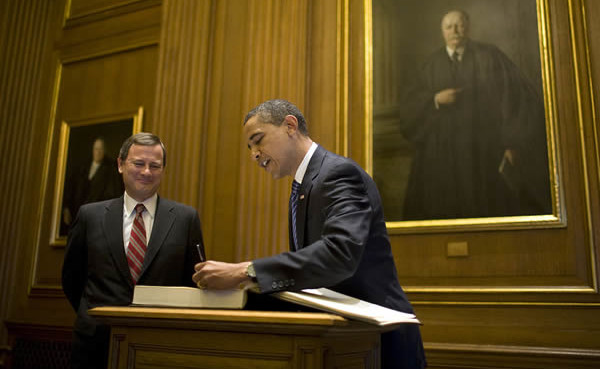In my fifth column for BPR, back in October 2012, I wrote about the Supreme Court striking down campaign finance laws. Last week, the high court continued to chip away at these laws. This time, in McCutcheon v. Federal Election Commission, the court declared unconstitutional overall limits on giving by individuals to candidate and parties. Previously, individuals could only give (over a two-year election cycle) $48,600 to all federal candidates and $74,600 to all political party committees.
The idea that campaign contributions are protected speech is not new. And, despite outrage by some liberals, it’s not preposterous either. Anyone who’s donated to a campaign will say it was an act of political participation, if not always a public one. What’s new is a determination by the court of Chief Justice John Roberts that only concerns about direct corruption provide a basis for limitations on campaign contributions. By creating this narrow rationale, Roberts has found room to strike down various campaign finance laws on First Amendment grounds.
Direct corruption is not the issue in campaign financing. As I discussed in my earlier column, the issue is more about influence and access. Contributions might not buy votes, but they can get organizations a seat at the table. Some issues that come before Congress don’t garner attention because of their complexity or obscurity. It seems reasonable to suggest that when the public or party voice isn’t strong, politicians will listen to those who control the precious pipeline of needed campaign funds.
Even beyond corruption or influence, there are downsides to all that money sloshing around. It forces politicians to fundraise constantly, by some accounts four or five hours a day (although this may be an exaggeration). When so much money is needed to run a campaign, wealthy candidates are at an advantage. And the public seems to want some limits on campaign finance, suggesting they have more concerns than the Roberts court.
Some have found a silver lining in this decision. David Brooks, expressing a popular conservative opinion, writes that this ruling will strengthen the hand of political parties by allowing them to fundraise more. Brooks sees parties as a moderating influence, with more transparency and accountability than individual candidates or political action committees (PACs). Brooks also argues that stronger parties will be able to fund challenges to incumbents of the opposing party, thereby leading to more competitive elections. He writes that incumbents generally favor the current system because, although it forces them to fundraise endlessly, it makes it even harder to unseat incumbents.
Brooks’ arguments make a lot of sense. His opinion that money will find a way into campaigns no matter what, and limiting one avenue just redirects the flow of cash, is probably true. And the rise of Super PACs did occur after the McCain-Feingold Act limited what parties could do with contributions. The emergence of the Tea Party was fueled by PAC money, and the Tea Party has been an outside force pushing the Republican Party in a conservative direction.
But stronger political parties are probably not the answer to public concerns about the role of money in politics. As the Center for Responsive Politics notes, 591 donors, or 0.0000019 percent of the population, maxed out the just-overturned federal candidate contribution limits. Presumably, these 591 donors were also giving to Super PACs after they hit the limits to candidates (although we don’t know this for sure). If these 591 people start funneling money to political parties after this decision, is democracy better off? Parties might be more transparent and moderate, but they still seem susceptible to being influenced by a small group of ultra-rich donors. It is too late to put that genie back in the bottle, especially with the court unlikely to tolerate any limits on contributions. Tea Party members would say that parties can stifle opinions considered outside the mainstream, and would argue that homogenized parties – while creating more palatable discourse – are not indicators of a healthier democracy. Without contribution limits or a public campaign funding system, candidates or parties will always need to seek out those with the money.Brooks’ argument for stronger parties is attractive because it provides the only glimmer that some good might come out of these Supreme Court decisions. With a divided Congress and a committed court, new reform seems unlikely absent a constitutional amendment or a shakeup among the justices. We might look to the United Kingdom, which instead of limiting contributions regulates campaign spending. The country also bans political advertising. Such regulations would undoubtedly raise First Amendment concerns here. And this is a good thing: the First Amendment’s protection of free speech is probably the best thing about the U.S. Constitution, and we should jealously guard it. But no rights are absolute – the court has put limits on speech that directly harm others, and has allowed discrimination if it tries to help minorities. Perhaps a future court will realize that limiting the free speech of politicians or donors, if done thoughtfully, might actually create a stronger democracy.
